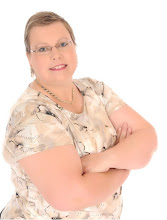Kandy Siahaya, author of Making Light of Being Heavy (see review below) was kind enough to take some time to answer my questions about her book and her life.
Jennifer Walker: Have you done any writing before, or other than, Making Light of Being Heavy? If not, what made you decide to start, and do you plan to do any more?
Kandy Siahaya: No, Making Light of Being Heavy was my first book. I wrote it because it is a subject I know very well and think people in general can be too critical at times. I know my perspective may not be the mainstream and was hoping to lighten the points of view of women like me as well as those who cannot relate.
Jennifer Walker: How much time did it take you to write Making Light of Being Heavy? Did you spend a lot of time on research?
Kandy Siahaya: Over a span of two years about six months. There really wasn't much to research, the book is for the most part just my opinion.
Jennifer Walker: From reading the book, it looks like you've been through quite a few diets. Have you ever consulted a doctor about your weight problem?
Kandy Siahaya: Yes. I do not have any medical issues related to my weight and I can remember one doctor telling me to eat less. I proceeded to tell him what I did eat in a normal day and that I was not overeating by any means and all he said again was to eat less. I think with every person it is different.
Jennifer Walker: Do you have any funny stories associated with the writing of Making Light of Being Heavy?
Kandy Siahaya: There were a few I put in the book but specifically during the time I was writing Making Light of Being Heavy I was pulled over by the cop about my seatbelt. He was actually very understanding when I told him it would be safer for me not to have it on because it really did not fit and if I was lucky enough to actually get it belted, losing oxygen to your brain in any instance cannot be good.
Jennifer Walker: Did you have good support from your friends and family while you wrote Making Light of Being Heavy? What do they say about it?
Kandy Siahaya: They all loved it and my "skinny" friends were surprised about a few things but told me it made them more aware which was part of the purpose of Making Light of Being Heavy.
Jennifer Walker: If you could say one thing to one person in your past who made fun of or were critical of your weight, what would it be?
Kandy Siahaya: Thank you. I believe being able to have this perspective not only came from the support of my mother and her point of view but from situations that really taught me how to just let it go.
Jennifer Walker: If you could say one thing to other women who suffer from weight problems, what would it be?
Kandy Siahaya: I know it is cliche but life is too short to stress about your weight, live your life and never regret anything that made you smile.
Jennifer Walker: If you were granted three wishes with no limitations, what would they be?
Kandy Siahaya: 1. For my mother to live a long, long time with no major medical issues. 2. For me to always have the means to care for my son and myself. 3. To always have the ability to help anyone that may need the help for whatever the reason.
Jennifer Walker: What accomplishment in your life are you most proud of?
Kandy Siahaya: How my son is growing into a wonderful young man.
Jennifer Walker: If you were banished to a deserted island for the rest of your life (one that has everything you need for basic survival, like food, water and shelter), and you were allowed to take one thing with you, what would it be?
Kandy Siahaya: Well if food, housing, etc. were provided but it was a deserted island with no entertainment, I would probably would prefer having my cable TV available so I could still watch "my shows" which is my escape every day from long days of work. I love to read but only being able to bring one book would not work well for me in this case...
Thank you, Kandy, and best of luck with Making Light of Being Heavy!
Our top 5 product picks for grooming shedding horses
6 months ago








